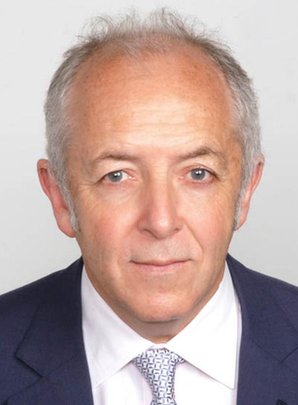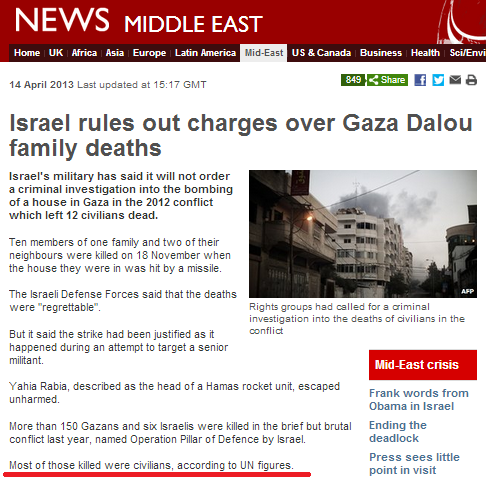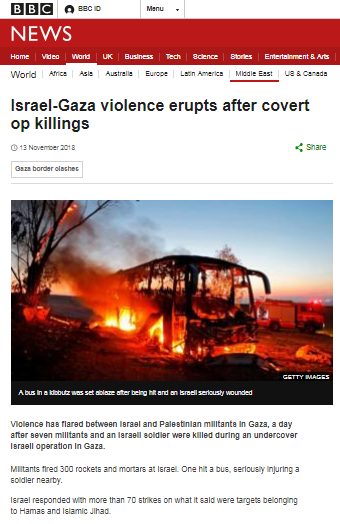On May 6th the BBC News website published an article titled “Hamas chooses Ismail Haniya as new leader” on its Middle East page.
Readers are told that: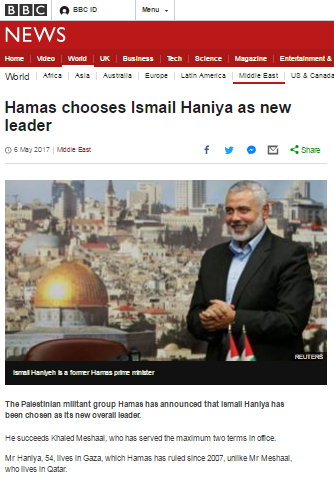
“Mr Haniya is seen as a pragmatist who will try to ease Hamas’s international isolation.”
However, audiences are not informed by whom exactly the new Hamas political bureau leader is regarded as “a pragmatist” and neither are they given any insight into Haniyeh’s record of decidedly unrealistic statements that the people who have suffered under his rule for the past decade might well find less than practical and sensible.
“The armed resistance and the armed struggle are the path and the strategic choice for liberating the Palestinian land, from the [Mediterranean] sea to the [Jordan] river, and for the expulsion of the invaders and usurpers [Israel]… We won’t relinquish one inch of the land of Palestine.” (Haniyeh, December 2011)
“Brothers and sisters, we were told [during the Gaza War] that if we wanted the war to stop and the siege to be lifted, and if we wanted the red carpet to be rolled out, so that we could reach the White House and other places, we would have to recognize Israel, to curse the resistance, and to release [Gilad] Shalit. We said, from the very heart of the siege, from under the ruins, from the places being bombarded by the F-16 planes… We said then, and I say to you now, in the capital of south Tunisia: We will never ever recognize Israel.” (Haniyeh, January 2012)
“…the resistance will continue until all Palestinian land, including al-Quds (Jerusalem), has been liberated and all the refugees have returned.”
“[The] gun is our only response to [the] Zionist regime. In time we have come to understand that we can obtain our goals only through fighting and armed resistance and no compromise should be made with the enemy.” (Haniyeh, February 2012)
“We think that the path of negotiations and peace talks has reached a dead end. The resistance (i.e., terror campaign, 2000-2005), which liberated Gaza [in 2005] and protected Gaza, can liberate the West Bank and the rest of the Palestinian lands, Allah willing. The liberator of Gaza, with the help of Allah, can liberate Jerusalem, the West Bank and the rest of Palestine (i.e., Israel).” (Haniyeh, May 2014)
“Gaza is part of Palestine and there will be no Palestinian state without Gaza and there will be no state without whole Palestine.” (Haniyeh, March 2017)
The BBC’s article links Haniyeh’s unsurprising nomination to the document released by Hamas several days earlier, portraying both events as an attempt to “soften its image” but failing to adequately clarify to readers why neither does any such thing.
“The group published a new policy document this week regarded as an attempt to soften its image. […]
This week, Hamas published its first new policy document since its founding charter.
It declares for the first time a willingness to accept an interim Palestinian state within pre-1967 boundaries, without recognising Israel. […]
The new document stresses it does not mean that Hamas now recognises Israel’s right to exist or that it no longer advocates violence against Israel.”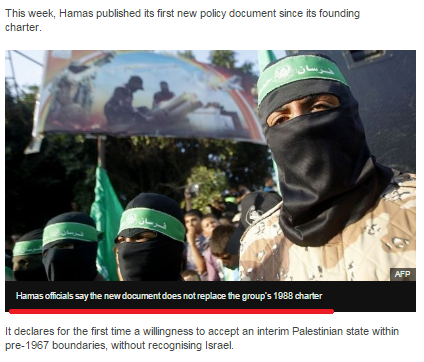
Readers are told that the Hamas Charter – which a photo caption correctly describes as not being replaced by the new document – includes “anti-Jewish language”.
“It [the new document] also says Hamas’s struggle is not with Jews but with “occupying Zionist aggressors”. The 1988 charter was condemned for its anti-Jewish language.”
Although the phrase “anti-Jewish language” was also seen in an earlier report on the topic of the new Hamas document, there it was clarified what that means.
“For years there has been criticism of Hamas over the language of its charter, in particular articles which were branded anti-Semitic.
The charter speaks of the need to fight “warmongering Jews” and cites a hadith – a report of what the Prophet Muhammad said or approved – that declares “The Day of Judgement will not come about until Muslims fight the Jews (killing the Jews)”.
It also refers to the “Jews’ usurpation of Palestine” and accuses Jews of controlling the world’s media and of being behind the French Revolution, secret societies and of controlling imperialist countries.”
No such explanation appears in this latest report.
While journalists at the BBC News website (in contrast to some of their colleagues) clearly understand that Hamas’ latest moves are no more than an attempt to embellish its image for various outside audiences, that its original antisemitic charter still stands and that no significant changes have been made to Hamas policy, curiously they apparently still find it appropriate to provide a platform for the spin of a ‘softer’ Hamas and refrain from informing audiences in clear terms that Ismail Haniyeh is no different to – and no more ‘pragmatic’ than – his predecessor.
Related Articles:
How will the BBC report Hamas’ upcoming botoxed manifesto?
Revisiting Jeremy Bowen’s facilitation of Hamas PR
BBC coverage of new Hamas document – part one: website
BBC coverage of new Hamas document – part two: World Service radio
BBC coverage of new Hamas document – part three: BBC Radio 4

